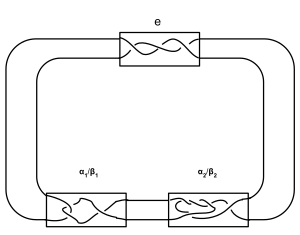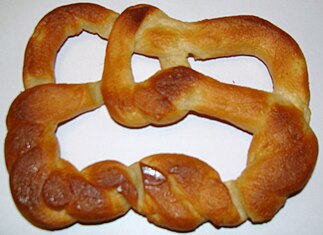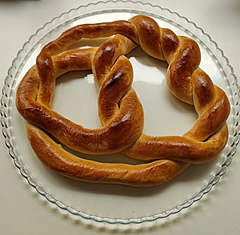| This article needs additional citations for verification. Please help improve this article by adding citations to reliable sources. Unsourced material may be challenged and removed. Find sources: "Pretzel link" – news · newspapers · books · scholar · JSTOR (August 2010) (Learn how and when to remove this message) |

 P(5,3,-2) = T(5,3) = 10124
P(5,3,-2) = T(5,3) = 10124 P(3,3,-2) = T(4,3) = 819Only two knots are both torus and pretzel
P(3,3,-2) = T(4,3) = 819Only two knots are both torus and pretzel
In the mathematical theory of knots, a pretzel link is a special kind of link. It consists of a finite number of tangles made of two intertwined circular helices. The tangles are connected cyclicly, and the first component of the first tangle is connected to the second component of the second tangle, the first component of the second tangle is connected to the second component of the third tangle, and so on. Finally, the first component of the last tangle is connected to the second component of the first. A pretzel link which is also a knot (that is, a link with one component) is a pretzel knot.
Each tangle is characterized by its number of twists: positive if they are counter-clockwise or left-handed, negative if clockwise or right-handed. In the standard projection of the pretzel link, there are left-handed crossings in the first tangle, in the second, and, in general, in the nth.
A pretzel link can also be described as a Montesinos link with integer tangles.
Some basic results
The pretzel link is a knot iff both and all the are odd or exactly one of the is even.
The pretzel link is split if at least two of the are zero; but the converse is false.
The pretzel link is the mirror image of the pretzel link.
The pretzel link is isotopic to the pretzel link. Thus, too, the pretzel link is isotopic to the pretzel link.
The pretzel link is isotopic to the pretzel link. However, if one orients the links in a canonical way, then these two links have opposite orientations.
Some examples
The (1, 1, 1) pretzel knot is the (right-handed) trefoil; the (−1, −1, −1) pretzel knot is its mirror image.
The (5, −1, −1) pretzel knot is the stevedore knot (61).
If p, q, r are distinct odd integers greater than 1, then the (p, q, r) pretzel knot is a non-invertible knot.
The (2p, 2q, 2r) pretzel link is a link formed by three linked unknots.
The (−3, 0, −3) pretzel knot (square knot (mathematics)) is the connected sum of two trefoil knots.
The (0, q, 0) pretzel link is the split union of an unknot and another knot.
Montesinos
A Montesinos link is a special kind of link that generalizes pretzel links (a pretzel link can also be described as a Montesinos link with integer tangles). A Montesinos link which is also a knot (i.e., a link with one component) is a Montesinos knot.
A Montesinos link is composed of several rational tangles. One notation for a Montesinos link is .
In this notation, and all the and are integers. The Montesinos link given by this notation consists of the sum of the rational tangles given by the integer and the rational tangles
These knots and links are named after the Spanish topologist José María Montesinos Amilibia, who first introduced them in 1973.
Utility
(−2, 3, 2n + 1) pretzel links are especially useful in the study of 3-manifolds. Many results have been stated about the manifolds that result from Dehn surgery on the (−2,3,7) pretzel knot in particular.
The hyperbolic volume of the complement of the (−2,3,8) pretzel link is 4 times Catalan's constant, approximately 3.66. This pretzel link complement is one of two two-cusped hyperbolic manifolds with the minimum possible volume, the other being the complement of the Whitehead link.
 A Montesinos link. In this example, , and .
A Montesinos link. In this example, , and . Edible (−2,3,7) pretzel knot
Edible (−2,3,7) pretzel knot Another edible (–2,3,7) pretzel knot, glazed to perfection
Another edible (–2,3,7) pretzel knot, glazed to perfection
References
- "10 124", The Knot Atlas. Accessed November 19, 2017.
- Pretzel link at Mathcurve
- ^ Kawauchi, Akio (1996). A survey of knot theory. Birkhäuser. ISBN 3-7643-5124-1
- Zieschang, Heiner (1984), "Classification of Montesinos knots", Topology (Leningrad, 1982), Lecture Notes in Mathematics, vol. 1060, Berlin: Springer, pp. 378–389, doi:10.1007/BFb0099953, MR 0770257
- Montesinos, José M. (1973), "Seifert manifolds that are ramified two-sheeted cyclic coverings", Boletín de la Sociedad Matemática Mexicana, 2, 18: 1–32, MR 0341467
- Agol, Ian (2010), "The minimal volume orientable hyperbolic 2-cusped 3-manifolds", Proceedings of the American Mathematical Society, 138 (10): 3723–3732, arXiv:0804.0043, doi:10.1090/S0002-9939-10-10364-5, MR 2661571.
Further reading
- Trotter, Hale F.: Non-invertible knots exist, Topology, 2 (1963), 272–280.
- Burde, Gerhard; Zieschang, Heiner (2003). Knots. De Gruyter studies in mathematics. Vol. 5 (2nd revised and extended ed.). Walter de Gruyter. ISBN 3110170051. ISSN 0179-0986. Zbl 1009.57003.
| Knot theory (knots and links) | |
|---|---|
| Hyperbolic |
|
| Satellite | |
| Torus | |
| Invariants | |
| Notation and operations | |
| Other | |
 pretzel link, there are
pretzel link, there are  left-handed crossings in the first tangle,
left-handed crossings in the first tangle,  in the second, and, in general,
in the second, and, in general,  in the nth.
in the nth.
 pretzel link is a
pretzel link is a  and all the
and all the  are
are  pretzel link is the
pretzel link is the  pretzel link. Thus, too, the
pretzel link. Thus, too, the  pretzel link.
pretzel link.
 pretzel link is isotopic to the
pretzel link is isotopic to the  pretzel link. However, if one orients the links in a canonical way, then these two links have opposite orientations.
pretzel link. However, if one orients the links in a canonical way, then these two links have opposite orientations.
 .
.
 and all the
and all the  and
and  are integers. The Montesinos link given by this notation consists of the
are integers. The Montesinos link given by this notation consists of the 
 ,
,  and
and  .
.